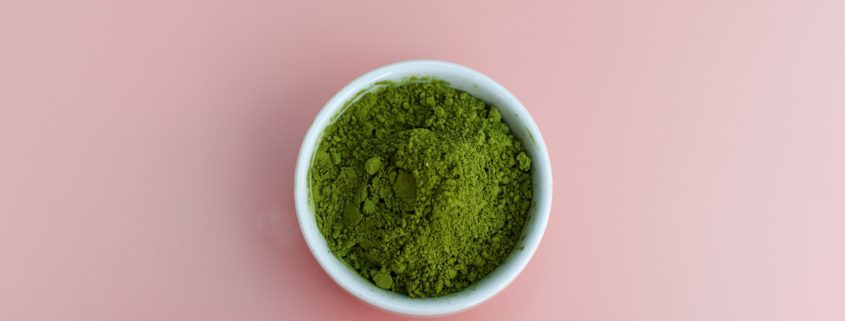What are the benefits of Matcha tea?
Ever since “The Ellementa Show” episode featuring one of our favorite healthcare providers, Dr. Swathi, about the benefits of matcha tea, our team has been obsessed with scooping up the bright green powder and whisking it into our tea cups before our morning check-ins. We love the way it perks us up and makes us feel more focused and energized without the jittery feeling that coffee sometimes gives.
 Matcha is different from the standard green tea you’ve probably tried before. You won’t find real matcha as a loose leaf tea. Matcha is made by steaming and drying young tea leaves and then grinding them into a fine powder. Traditionally, matcha tea is prepared using a bamboo whisk in a zig zag fashion to blend the powder in hot water inside a ceremonial bowl.
Matcha is different from the standard green tea you’ve probably tried before. You won’t find real matcha as a loose leaf tea. Matcha is made by steaming and drying young tea leaves and then grinding them into a fine powder. Traditionally, matcha tea is prepared using a bamboo whisk in a zig zag fashion to blend the powder in hot water inside a ceremonial bowl.
There’s something soothing about this ritual of making matcha tea in this manner, even if you’re using a regular whisk and glass measuring cup. A beverage blender will also do the trick. Note that using a mug may not give your whisk enough room to blend unless you use a smaller whisk.
Though matcha powder is primarily used for tea, it is a versatile ingredient that you can add to a variety of foods and dishes including green tea ice cream, yogurt, pudding, and pasta. Keep in mind matcha as a slightly bitter flavor (more bitter if a lesser quality brand). There are two main types of matcha: Ceremonial grade that provides a smoother drinking experience, and Culinary or Cooking grade that is less refined and better for mixing into your smoothie or for baking.
We came up with a few plant-based matcha recipes of our own, including a matcha tea latte, matcha pistachio white chocolate cookies, overnight chia matcha pudding, matcha sweet potato gnocchi with miso sauce, and vegan matcha ice cream.
You can download our Matcha Tea Recipe book here!
Matcha is much more than a lovely tea or a versatile ingredient. Matcha is a powerful antioxidant with adaptogenic properties, meaning that it can help your body and brain better adapt to managing – and counteracting – stress. Below are four health benefits of matcha tea.
Benefit of Matcha Tea #1: Matcha tea is an anti-inflammatory.
“There are 100 times more antioxidants in matcha than in traditional green tea,” says Dr. Swathi. Matcha is rich in antioxidants called polyphenols. Polyphenols are natural compounds that have been shown to help reduce inflammation and can be used to help fight cancer.
Benefit of Matcha Tea #2: Matcha tea can protect your cells and slow the aging process.
Matcha is high in Epigallocatechin Gallate or EGCG (catechin), a plant-based compound that can boost metabolism and research shows it could protect your cells from damage and help prevent disease. EGCG also may slow the growth of cancer cells. Matcha could Increase the benefit of certain oncology medications, according to Dr. Swathi.
Benefit of Matcha Tea #3: Matcha tea can help you focus.
Matcha tea contains L-theanine, a glutamate molecule that can cross the blood brain barrier. According to Dr. Swathi, it can “increase your alpha waves and your alertness.” Because matcha has less caffeine than coffee – 70g versus 170g of caffeine in a cup of coffee – it has less chance of giving you the jitters.
When graphed, the alertness you get from caffeine spikes way up then crashes down. With Matcha, the alertness graph slopes gently up, is sustained, and then slopes gently down.
Benefit of Matcha Tea #4: May help with weight loss.
Studies about green tea and weight loss have mostly been conducted using super concentrated green tea extract – so we don’t really know if much smaller doses of matcha or green tea actually do aid in weight loss. But, matcha may help with weight loss by boosting the effects of fat-burning hormones like norepinephrine. EGCG in matcha tea can help inhibit an enzyme that breaks down norepinephrine, which increases the amount of the hormone in your body, potentially promoting fat breakdown. Plus, Matcha tea contains zero calories!
If you’re looking for a gently stimulating tea that can protect your body and brain, matcha tea may be the perfect addition to your morning wake-up routine – or for any time during the day. Don’t forget to try our recipes – or let us know how YOU are using, and cooking with, matcha tea!
References
Read these studies about matcha tea and some additional benefits:
- Beneficial effects of green tea: A literature review
- Determination of catechins in matcha green tea by micellar electrokinetic chromatography
- Antioxidant Properties and Nutritional Composition of Matcha Green Tea
- L-theanine, a natural constituent in tea, and its effect on mental state
- Green tea and thermogenesis: interactions between catechin-polyphenols, caffeine and sympathetic activity
- Enzymology of methylation of tea catechins and inhibition of catechol-O-methyltransferase by (-)-epigallocatechin gallate
- Effect of green tea supplementation on blood pressure





